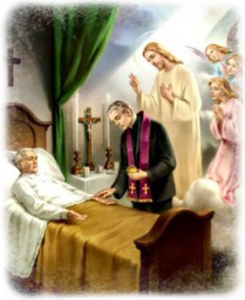The Anointing of the Sick
 (1499) “By the sacred anointing of the sick and the prayer of the priests the whole Church commends those who are ill to the suffering and glorified Lord, that he may raise them up and save them. And indeed she exhorts them to contribute to the good of the People of God by freely uniting themselves to the Passion and death of Christ.”98
(1499) “By the sacred anointing of the sick and the prayer of the priests the whole Church commends those who are ill to the suffering and glorified Lord, that he may raise them up and save them. And indeed she exhorts them to contribute to the good of the People of God by freely uniting themselves to the Passion and death of Christ.”98
(1525) Thus, just as the sacraments of Baptism, Confirmation, and the Eucharist form a unity called “the sacraments of Christian initiation,” so too it can be said that Penance, the Anointing of the Sick and the Eucharist as viaticum constitute at the end of Christian life “the sacraments that prepare for our heavenly homeland” or the sacraments that complete the earthly pilgrimage.
(1527) The sacrament of Anointing of the Sick has as its purpose the conferral of a special grace on the Christian experiencing the difficulties inherent in the condition of grave illness or old age. (1529) Each time a Christian falls seriously ill, he may receive the Anointing of the Sick, and also when, after he has received it, the illness worsens.
(1530) Only priests (presbyters and bishops) can give the sacrament of the Anointing of the Sick, using oil blessed by the bishop, or if necessary by the celebrating presbyter himself. (1531) The celebration of the Anointing of the Sick consists essentially in the anointing of the forehead and hands of the sick person (in the Roman Rite) or of other parts of the body (in the Eastern rite), the anointing being accompanied by the liturgical prayer of the celebrant asking for the special grace of this sacrament.
Effects of this Sacrament
(1520) A particular gift of the Holy Spirit. The first grace of this sacrament is one of strengthening, peace and courage to overcome the difficulties that go with the condition of serious illness or the frailty of old age. This grace is a gift of the Holy Spirit, who renews trust and faith in God and strengthens against the temptations of the evil one, the temptation to discouragement and anguish in the face of death.135 This assistance from the Lord by the power of his Spirit is meant to lead the sick person to healing of the soul, but also of the body if such is God’s will.136 Furthermore, “if he has committed sins, he will be forgiven.”137
(1521) Union with the passion of Christ. By the grace of this sacrament the sick person receives the strength and the gift of uniting himself more closely to Christ’s Passion: in a certain way he is consecrated to bear fruit by configuration to the Savior’s redemptive Passion. Suffering, a consequence of original sin, acquires a new meaning; it becomes a participation in the saving work of Jesus.
(1522) An ecclesial grace. The sick who receive this sacrament, “by freely uniting themselves to the passion and death of Christ,” “contribute to the good of the People of God.”138 By celebrating this sacrament the Church, in the communion of saints, intercedes for the benefit of the sick person, and he, for his part, though the grace of this sacrament, contributes to the sanctification of the Church and to the good of all men for whom the Church suffers and offers herself through Christ to God the Father.
(1523) A preparation for the final journey. If the sacrament of anointing of the sick is given to all who suffer from serious illness and infirmity, even more rightly is it given to those at the point of departing this life; so it is also called sacramentum exeuntium (the sacrament of those departing).139 The Anointing of the Sick completes our conformity to the death and Resurrection of Christ, just as Baptism began it. It completes the holy anointings that mark the whole Christian life: that of Baptism which sealed the new life in us, and that of Confirmation which strengthened us for the combat of this life. This last anointing fortifies the end of our earthly life like a solid rampart for the final struggles before entering the Father’s house.140
(1532) The special grace of the sacrament of the Anointing of the Sick has as its effects:
- the uniting of the sick person to the passion of Christ, for his own good and that of the whole Church;
- the strengthening, peace, and courage to endure in a Christian manner the sufferings of illness or old age;
- the forgiveness of sins, if the sick person was not able to obtain it through the sacrament of Penance;
- the restoration of health, if it is conducive to the salvation of his soul;
- the preparation for passing over to eternal life.
For information about Anointing of Sick, please contact the church office at (661) 323-3148
